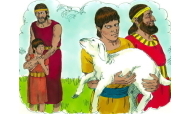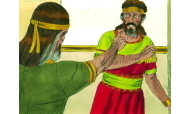II Samuel 11:27 through 12:25 records David's interaction with the prophet Nathan in which David recognizes his sin because of a story God instructs Nathan to tell him. Upon hearing the story, David’s reaction is that “the man that hath done this thing shall surely die: And he shall restore the lamb fourfold”. Upon initial reading, this seems to be David’s judgment upon the man as king. What is unusual about this judgment, however, is that restoring a lamb fourfold is impertinent when sentencing a man to death. This calls the text into question. In the Lamsa Bible David’s reaction reads:
...the man who has done this thing is worthy of death; And he shall
restore the ewe lamb fourfold because he did this thing and because he
had no pity. II Samuel 12:5,6
In the course of events, judgment was pronounced upon David.
Wherefore hast thou despised the commandment of the LORD, to do evil
in his sight? thou hast killed Uriah the Hittite with the sword, and
hast taken his wife to be thy wife, and hast slain him with the sword
of the children of Ammon. Now therefore the sword shall never depart
from thine house; because thou hast despised me, and hast taken the
wife of Uriah the Hittite to be thy wife. Thus saith the LORD, Behold,
I will raise up evil against thee out of thine own house, and I will
take thy wives before thine eyes, and give them unto thy neighbour,
and he shall lie with thy wives in the sight of this sun. For thou
didst it secretly: but I will do this thing before all Israel, and
before the sun. II Samuel 12:9-12



Since the judgment pronounced upon David did not include his death, it appears that David's reaction that the man was worthy of death was an overreaction. This is because the offense in the story of the man with the sheep was in actuality David's offense. We cannot be certain it was an overreaction, however, since we know that David recognized his sin, while we are not told if the man in the story of the sheep recognized his.


